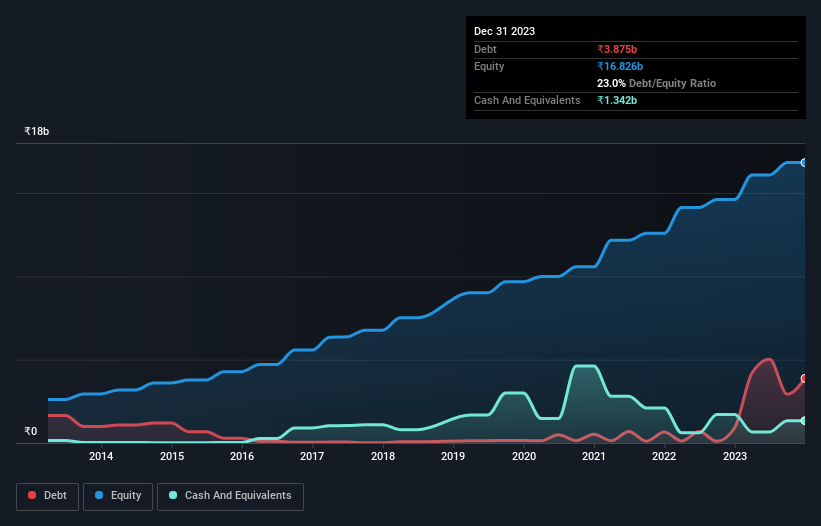
Warren Buffett famously said, 'Volatility is far from synonymous with risk.' It's only natural to consider a company's balance sheet when you examine how risky it is, since debt is often involved when a business collapses. We note that V-Guard Industries Limited (NSE:VGUARD) does have debt on its balance sheet. But the real question is whether this debt is making the company risky.
Why Does Debt Bring Risk?
Debt and other liabilities become risky for a business when it cannot easily fulfill those obligations, either with free cash flow or by raising capital at an attractive price. Ultimately, if the company can't fulfill its legal obligations to repay debt, shareholders could walk away with nothing. However, a more common (but still painful) scenario is that it has to raise new equity capital at a low price, thus permanently diluting shareholders. Of course, plenty of companies use debt to fund growth, without any negative consequences. When we examine debt levels, we first consider both cash and debt levels, together.
View our latest analysis for V-Guard Industries
How Much Debt Does V-Guard Industries Carry?
As you can see below, at the end of September 2023, V-Guard Industries had ₹3.88b of debt, up from ₹913.7m a year ago. Click the image for more detail. On the flip side, it has ₹1.34b in cash leading to net debt of about ₹2.53b.

How Healthy Is V-Guard Industries' Balance Sheet?
The latest balance sheet data shows that V-Guard Industries had liabilities of ₹8.47b due within a year, and liabilities of ₹4.27b falling due after that. Offsetting this, it had ₹1.34b in cash and ₹4.59b in receivables that were due within 12 months. So its liabilities total ₹6.81b more than the combination of its cash and short-term receivables.
Since publicly traded V-Guard Industries shares are worth a total of ₹138.0b, it seems unlikely that this level of liabilities would be a major threat. Having said that, it's clear that we should continue to monitor its balance sheet, lest it change for the worse.
We use two main ratios to inform us about debt levels relative to earnings. The first is net debt divided by earnings before interest, tax, depreciation, and amortization (EBITDA), while the second is how many times its earnings before interest and tax (EBIT) covers its interest expense (or its interest cover, for short). This way, we consider both the absolute quantum of the debt, as well as the interest rates paid on it.
V-Guard Industries has net debt of just 0.69 times EBITDA, indicating that it is certainly not a reckless borrower. And it boasts interest cover of 9.5 times, which is more than adequate. And we also note warmly that V-Guard Industries grew its EBIT by 14% last year, making its debt load easier to handle. When analysing debt levels, the balance sheet is the obvious place to start. But ultimately the future profitability of the business will decide if V-Guard Industries can strengthen its balance sheet over time. So if you're focused on the future you can check out this free report showing analyst profit forecasts.
But our final consideration is also important, because a company cannot pay debt with paper profits; it needs cold hard cash. So it's worth checking how much of that EBIT is backed by free cash flow. In the last three years, V-Guard Industries's free cash flow amounted to 48% of its EBIT, less than we'd expect. That's not great, when it comes to paying down debt.
Our View
Happily, V-Guard Industries's impressive net debt to EBITDA implies it has the upper hand on its debt. And that's just the beginning of the good news since its interest cover is also very heartening. When we consider the range of factors above, it looks like V-Guard Industries is pretty sensible with its use of debt. That means they are taking on a bit more risk, in the hope of boosting shareholder returns. There's no doubt that we learn most about debt from the balance sheet. However, not all investment risk resides within the balance sheet - far from it. To that end, you should be aware of the 1 warning sign we've spotted with V-Guard Industries .
Of course, if you're the type of investor who prefers buying stocks without the burden of debt, then don't hesitate to discover our exclusive list of net cash growth stocks, today.
New: Manage All Your Stock Portfolios in One Place
We've created the ultimate portfolio companion for stock investors, and it's free.
• Connect an unlimited number of Portfolios and see your total in one currency
• Be alerted to new Warning Signs or Risks via email or mobile
• Track the Fair Value of your stocks
Have feedback on this article? Concerned about the content? Get in touch with us directly. Alternatively, email editorial-team (at) simplywallst.com.
This article by Simply Wall St is general in nature. We provide commentary based on historical data and analyst forecasts only using an unbiased methodology and our articles are not intended to be financial advice. It does not constitute a recommendation to buy or sell any stock, and does not take account of your objectives, or your financial situation. We aim to bring you long-term focused analysis driven by fundamental data. Note that our analysis may not factor in the latest price-sensitive company announcements or qualitative material. Simply Wall St has no position in any stocks mentioned.
About NSEI:VGUARD
V-Guard Industries
Manufactures and sells electrical and electronic products in India and internationally.
Solid track record with excellent balance sheet and pays a dividend.

